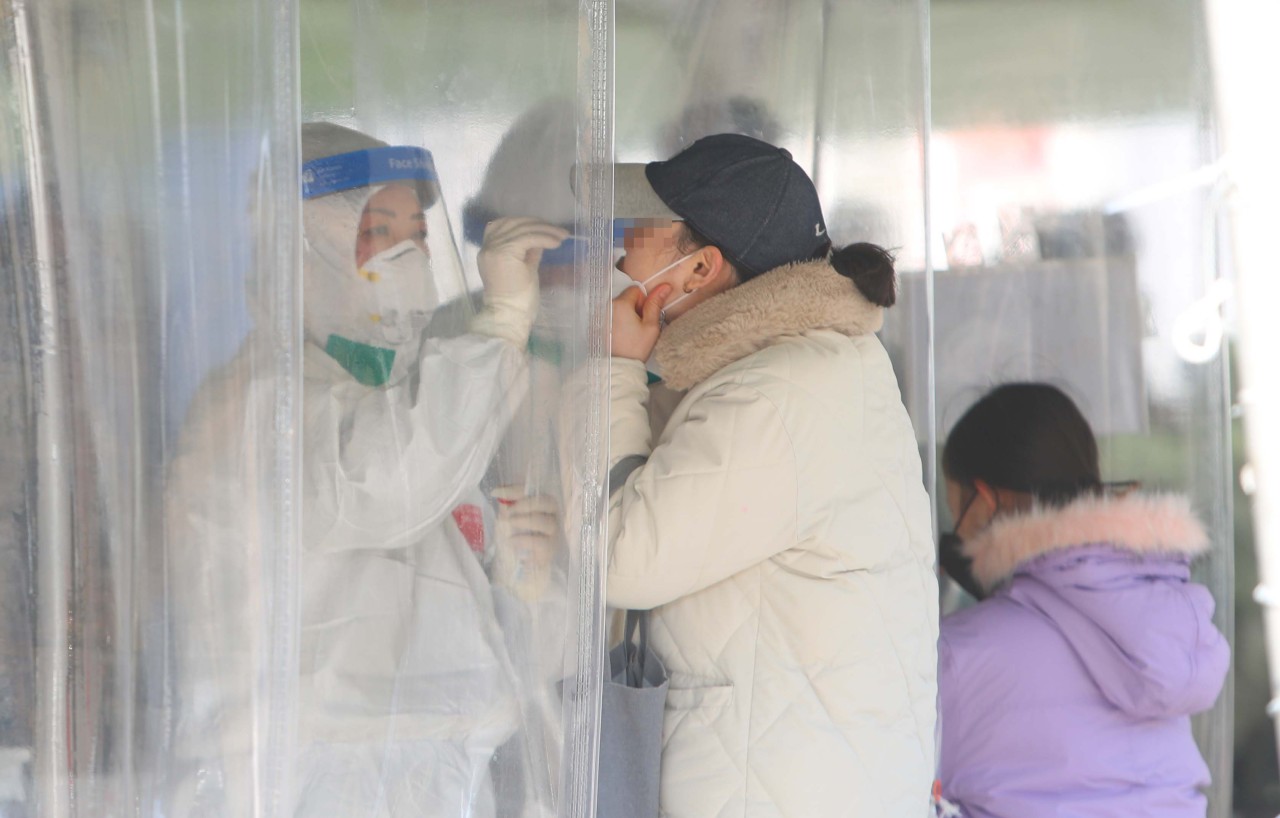 |
This photo taken Friday, shows a woman taking a coronavirus test at a makeshift testing center in Daegu, 300 kilometers south of Seoul. (Yonhap) |
Korea is limiting the polymerase chain reaction, or PCR, tests -- which have long remained the gold standard of COVID-19 diagnosis -- in parts of country where omicron is dominant, according to the Ministry of Health and Welfare Friday.
Coming into effect from Jan. 26 in three cities of Gwangju, Pyeongtaek, Anseong and the entire South Jeolla Province, the new testing protocol will be expanded to the rest of Korea once omicron officially becomes dominant nationwide.
Omicron showed up in 47 percent of newly sequenced samples this week, according to Friday’s announcement, up from 26 percent a week ago. A week before that the proportion of omicron in analyzed samples was 12 percent. Fifty percent is considered the threshold for dominant status.
About 25 percent of positive samples are sequenced for variants of concern on a weekly basis in Korea.
“The changes are about prioritizing vulnerable groups for access to limited medical resources, rather than managing the entire population,” the ministry said.
The ministry says Korea has ramped up its capacities to be able to carry out as many as 850,000 PCR tests a day.
Priority-based PCR testing
PCR testing for priority groups include people who have been in close contact with confirmed patients; people ages 60 and older who are suspected of having COVID-19; and people who have tested positive in rapid antigen tests.
For people who are not a priority, in the event of symptoms, they need to see a doctor at designated clinics for a note on whether they should be tested. The cost of each visit to the clinic is around 5,000 won ($4.19). The list of select clinics for patients with symptoms can be found at:
mohw.go.kr/react/popup_200128_5.html.
Rapid testing for COVID-19 pass with 24-hour expiryRapid antigen testing will replace PCR for COVID-19 passes, which requires people to show proof of a negative test or vaccination when entering public places, . Previously, PCR was the only testing option for a pass.
As with PCR tests, rapid tests for the purpose of obtaining a pass must be performed at testing centers. Samples can be collected by health professionals or test takers themselves using nasal swabs. Tests taken at home will not be recognized.
To be used as a pass, the negative rapid test has to be obtained no more than 24 hours prior to entry.
PCR testing only for international arrivalsAll passengers entering Korea must submit a negative PCR test conducted within 48 hours before their arrival here.
People can travel from the airport to the place of their quarantine using COVID-19-proof cabs, buses and trains only, unless they can drive their own car. The mandatory post-travel quarantine period is 10 days.
Essential business travelers who are exempt from quarantine must work remotely for the first three days upon arrival.
Rapid test accuracy concernsThe Korean Society for Laboratory Medicine says rapid antigen tests are less sensitive against omicron, and recommends against relying on their use to find infections.
Son Young-rae, the Health Ministry spokesperson, said in Friday’s briefing that rapid tests are “highly accurate in detecting negative cases,” but carried a risk of false positives. The ministry says rapid tests used here can detect negative cases with 99 percent accuracy.
By Kim Arin (
arin@heraldcorp.com)







![[Robert Fouser] Accepting migrants in South Korea](http://res.heraldm.com/phpwas/restmb_idxmake.php?idx=644&simg=/content/image/2024/10/31/20241031050896_0.jpg)
